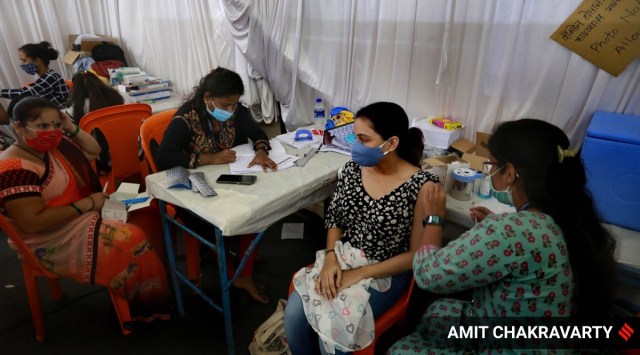The 6.77 crore doses administered in the 13 days from June 21 to July 3 represents a 67 per cent increase in vaccinations over the preceding 13-day period, that is June 8-20. Daily vaccinations have averaged 52.08 lakh since June 21, compared to 31.20 lakh in the preceding 13 days, the data show.

Since June 21, the Centre has procured 75 per cent of doses from the open market and distributed them to states to be given for free to citizens above the age of 18 years. The remaining 25 per cent of the stock has been reserved for procurement by private facilities to carry out vaccinations against payment.
Story continues below this ad
Between May 1 — when vaccinations were opened to the 18-44-year age group — and June 20, 18-44-year-olds could be vaccinated only from the bucket of 50 per cent of vaccines that were procured from the open market by individual state governments and private hospitals.
Significantly, the shift to centralised procurement from June 21 coincided with an increase in the supply of vaccines, as Serum Institute of India and Bharat Biotech ramped up their production of Covishield and Covaxin respectively.
ExplainedVaccines in villages
Of the eight states that saw an over 50% increase in vaccinations between June 21 and July 3, compared to the preceding 13-day period, most have a majority rural population, indicating vaccine footprint beyond cities.
In the 13 days since the policy change, vaccination for 18-44-year-olds increased by 71 per cent over the preceding 13-day period. In absolute numbers, from June 21 to July 3, the country administered 1.86 crore more doses to the 18-44 group compared to the June 8-20 period.
However, the coverage of this group as a percentage of the total population increased by just a percentage point in comparison.
Story continues below this ad
So, between June 8 and June 20, India administered 2.62 crore doses to the 18-44 group, which constituted 65 per cent of the total vaccinations in this window.
And for the period June 21-July 3, this number stood at 4.48 crore doses — 66 per cent of the total vaccinations in this window.
Due to the increased supply, the number of second doses has increased significantly since June 21, the data show — 1.24 crore second doses were administered from June 21-July 3 compared to 45.19 lakh second doses in the preceding 13-day period.
Thirteen large states — Uttar Pradesh, Madhya Pradesh, Maharashtra, Karnataka, Gujarat, Rajasthan, West Bengal, Tamil Nadu, Bihar, Kerala, Telangana, Andhra Pradesh, and Odisha — have so far administered more than 1 crore doses of vaccine each.
Story continues below this ad
In the 13 days since June 21, these 13 states have together administered a total 5.29 crore doses, which make up 78 per cent of all doses administered in the country during this period.
The total 6.77 crore doses that have been given since June 21 make up 19.27 per cent of the total doses administered since the beginning of the inoculation drive.
In five of the 1-crore-plus-vaccination states, the June 21-July 3 numbers add up to more than a fifth of the total inoculation numbers in these states. These states are Madhya Pradesh (29.67 per cent of the total vaccination), Uttar Pradesh (22.59 per cent), Karnataka (21.10 per cent), Telangana (20.75 per cent), and Tamil Nadu (20.63 per cent).
Another set of five states (out of the 13 largest) reported an over-100-per-cent increase in vaccinations in the 18-44 group during the June 21-July 3 period compared to the June 8-20 period: Madhya Pradesh (220 per cent), Odisha (133 per cent), Maharashtra (125 per cent), Karnataka (116 per cent), and Uttar Pradesh (114 per cent).
Story continues below this ad
This large increase, especially in Madhya Pradesh, Odisha, and UP, is almost entirely due to the fact that three-fourths of doses has been distributed by the Centre — the participation of the private sector in vaccination is very low in these three states.
Under the new policy, states have to aggregate the demand at smaller hospitals, and the Centre channelises the supply to them accordingly to address possible geographical inequity. The data indicate that participation of smaller private-sector hospitals empanelled in Ayushman Bharat will hold the key to increasing vaccination coverage in these states.
Eight of the 13 large states showed an increase of more than 50 per cent in vaccinations during June 21-July 3 compared to the preceding 13-day period. These states are Madhya Pradesh (257 per cent) Maharashtra (94 per cent), Uttar Pradesh (86 per cent), Karnataka (77 per cent), Odisha (72 per cent), Tamil Nadu (60 per cent), and Kerala (55 per cent).
The majority of the population in many of these states lives in rural areas; the increase in vaccinations therefore, also indicates a widening of the vaccination footprint in rural India.









